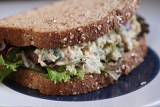Balanced Diet For Teens

Teenagers are advised to eat grains, vegetables, fruits, milk, meat and beans, and oils. Teenagers should consume a variety of vegetables and that over half of the grains consumed should be whole-wheat. In addition half a cup of vegetables and half a cup of fruits and 3 glasses of milk. Five ounces of meat m plenty of beans and what completes the healthy diet is a good exercise regime for the growing adolescent. The consumption of fast food has given rise to teenage obesity and although there is no specific diet plan or dietary program there are ways that a concerned parents can get their teenager to eat healthy meals. Parents should encourage family meals at the table, as teenagers tend to set their parents as role models therefore, they also emulate their parents in what they eat. Vegetables should be cut and left accessible for teenage children to munch on at any time of the day; as growing children they tend to get very hungry after outdoor activities and quick access to food is what they are looking food for , therefore fruits and vegetables in the forms of salads should be kept at an approachable distance within the reach of the teenage child. Teenagers come up with several issues that have to be dealt with sensibly and in a sensitive manner, therefore it is important for parents to keep the line of communication open, teenagers make friends and get new ideas from various sources so, as far as dietary matters are concerned, parents should discuss diet plans with their children and other concerns as well.

Diets For Teenagers / Important Food Items:
Teenagers from the age of 15 are always in need of nutrients, therefore it is necessary to give them nutrient-dense meals, with a substantial amount of magnesium and zinc, and minerals such as calcium and iron, along with plenty of water.
1. Calories: Teenage boys between 12 to 14 years of age have a calorie requirement of 2200 mg per day whereas teenage girls between the age of 12 to 14 have a calorie requirement of 1800 gms per day. Teenage boys between 15 to 18 years of age have a calorie requirement of 2700 mg per day whereas teenage girls between the age of 15 to 18 have a calorie requirement of 2200 gms per day.
2. Protein: Fish dairy products, eggs pulses and nuts are good examples of protein foods, and are very important for growing adolescents, especially teenage boys who develop muscles, and in general teenagers are growing children, who need enough protein to develop more cells in the growing body.
3. Fats: When it comes to fats one must understand that there are healthy fats as well as unhealthy fats, growing children can be given, two tables spoons of extra virgin olive oil along with a handful of nuts which will help to absorb, the proteins from the nuts better; examples of other healthy oils are sunflower oil, vegetable oil and groundnut oil. The unhealthy trans fats are found in hydrogenated vegetable oil and other products that contain hydrogenated vegetable oil.

4. Minerals: Calcium and iron are essential minerals required by the body, and teenage children, need calcium for the development of bones and the healthy upkeep of their teeth, good examples of calcium are green leafy vegetables, nuts, seeds, fortified bread, dry fruits, cereals etc. Good examples of iron-rich foods are wholemeal bread, green leafy vegetables, seeds nuts, pulses, baked beans, eggs, meat and soya mince or soya nuggets.
5. Vitamins: There are 11 vitamins and all these vitamins should be present in a healthy diet.
Vitamin B1 (Thiamin): Vitamin B 1 ensures the supply of energy to the brain and the nervous system, nuts are rich in vitamin B 1 along with pork. The deficiency of vitamin B1 causes poor vision and results in a weak immune system.
Vitamin B2 (Riboflavin): Vitamin B2, converts the food in our body into energy and maintains the health of our skin and mucous membrane. Vitamin B2 is available in certain breakfast cereal, along with dairy products including liver and kidney, The deficiency of the vitamin causes an eye or a mouth infection.
Vitamin B3 (Niacin): Vitamin B3 again helps to release energy from food and is contained in yeast extract, liver, fish and meat etc. the deficiency of Vitamin B3 causes, a rare skin disease called pellagra.

Vitamin B6 (Pyridoxine): Vitamin B6 is required by the body to maintain healthy blood, present in meat, fish eggs and whole grains. the deficiency of Vitamin B6 causes a chemical imbalance in the blood.
Vitamin B12: Vitamin B12 is required for the formation of blood cells, and the nervous system, sources of Vitamin B12 are fish and meat, the low intake of this vitamin causes nerve damage, and pernicious anaemia.
Folate: ( A B vitamin that is required for cell growth and reproduction). Folates are essential for healthy blood and foetal development and the lack of folates may lead to birth defects.
6. Vitamin C: Vitamin C is required for healthy teeth and bones, the improvement of the immune system, and importantly it helps in the absorption of iron, fresh fruits and vegetables are full of Vitamin c. The deficiency of vitamin C causes bleeding gums and a poor immune system.
7. Vitamin D: Vitamin D is required for healthy bones and is found in eggs, oily fish, and some cereals. The body has the ability to manufacture Vitamin D when expose The deficiency of vitamin C causes rickets, disease of children.
8. Vitamin E: Vitamin E adds protection against cancers and heart disease, it helps to maintain healthy glowing skin and is great for fertility as well, good sources of vitamin E are Seafood, seeds leafy green veg, poultry, whole grains, butter, egg yolk, nuts, etc..The deficiency of Vitamin causes problems with blood and the nervous system in children.

9. Vitamin K: Vitamin K is required for blood clotting in case of wounds, present in green leafy vegetables. The deficiency of Vitamin K can cause bleeding disorders at birth.